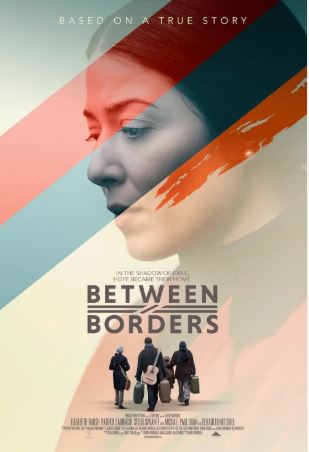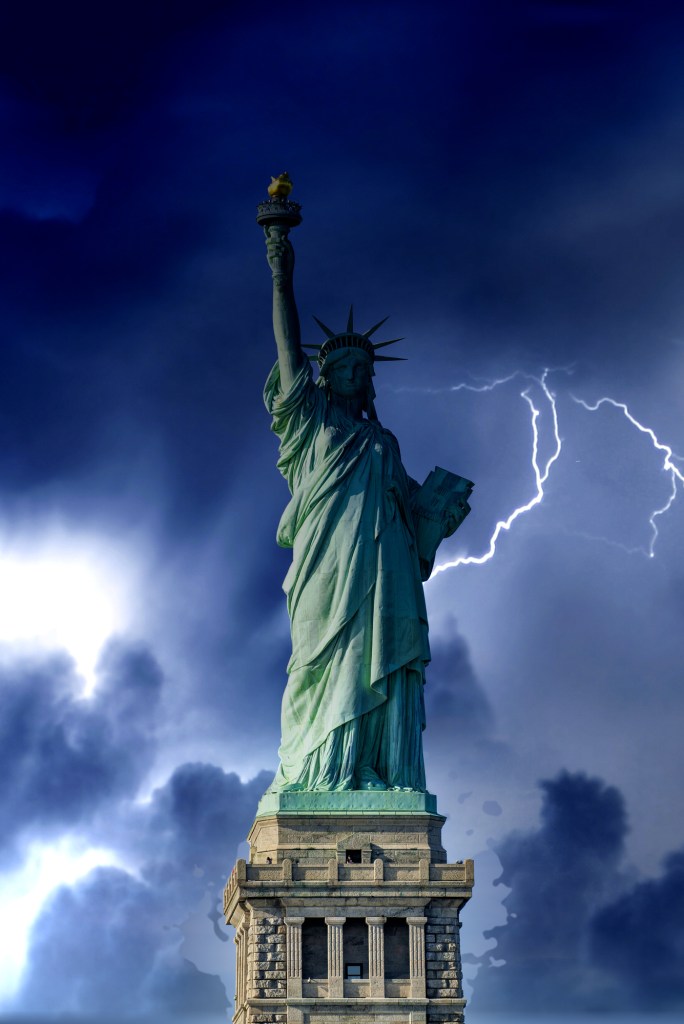
The story of Gladys and Nelson Gonzalez, an Orange County couple who were deported to Colombia after living in the United States for 35 years, raises concerns about the complexities of U.S. immigration law and the human cost of its enforcement. The Gonzalez’s case exposes the tension between the rule of law and the values of compassion and mercy, values that lie at the heart of Judeo-Christian ethic.
Gladys and Nelson Gonzalez fled Colombia in 1989, seeking asylum from violence, drugs, corruption, and instability. According to news reports, the couple hired attorneys to help them, but those attorneys were eventually disbarred. (See Fox News LA) The news reports don’t provide details on the disbarment or on the long and winding process that came to an impasse in 2021.
During this time Nelson Gonzalez (59) found work in a laboratory as a phlebotomist, and Gladys (55) remained home to care for three daughters who were born and raised here: Gabby (23), Stephanie (27), and Jessica (33). They paid federal and state income taxes for 35 years. They paid into a Social Security and Medicare system that would never benefit them. If they owned a home, they paid real estate taxes, and they paid sales taxes, gasoline taxes, etc. over that time period.
Gladys and Nelson Gonzalez regularly checked in with ICE, and they were granted extensions. They didn’t hide, and they faithfully stayed in contact. Gladys had just been granted another extension when ICE showed up for what seemed like a routine check in, and everything changed. As reported by the local news outlet, KTLA:
“They were put into handcuffs by their wrists and ankles and treated as criminals before getting to these detention centers,” Stephanie Gonzalez told KTLA. “All they said is they extended their stay, even though every year they’ve had permission to be here and they’re law-abiding citizens who show up and are doing their duty to check in with immigration and say, ‘Hey I’m here. I’m not hiding or doing anything wrong.’ Then they just arrested them like that.”
A spokesperson for U.S. Immigration and Customs Enforcement told The Orange County Register simply that the couple had “exhausted all legal options to remain in the U.S. between March 2000 and August 2021,” and they were in violation of immigration law. The news reports don’t explain the details of the legal process or why the attorneys were disbarred.
As an attorney myself, I can say with some degree of confidence that the attorneys they used were not good attorneys. Attorneys don’t get disbarred over mere incompetence, though attorneys who get disbarred are often incompetent, too. Attorneys get disbarred for taking their clients money and doing nothing, missing deadlines and court dates, embezzling client funds, violating court orders and other serious professional misconduct.

Immigrants like the Gonzalezes who leave their home countries because of desperate conditions usually have meager resources. Many of them spend their life savings just to get here. They seek asylum because they don’t know any other way forward, but proving eligibility for asylum is often very difficult. Without a competent attorney, the path is fraught with danger.
To be eligible for asylum, a person must be present in the United States. Such a person, by definition, doesn’t have legal status (yet), but petitioning for asylum requires a person to be present in the US.
Therefore, they must come here at the mercy of the process. They risk everything to seek asylum. It is the desperate path to legal status.
Eligibility for asylum requires evidence of persecution or “a well-grounded fear of future persecution“ from the government of their country of origin or from a group the government is unwilling or unable to control. The persecution must also be based on race, gender, nationality, political opinion, or membership in a particular social group.
For most asylum seekers, the only evidence they have is personal testimony. Other evidence is left behind in the country of origin. Most people without resources don’t have access to medical records of injuries or psychological trauma, police reports, court documents, or other official records that remain in their home country. The witnesses to their trauma are also not present to testify for them.
Attorneys charge upwards of $500 an hour. Costs can run into the thousands, but most asylum seekers have limited resources. They spend spent their life savings just to get here, often falling victim to the coyotes who prey on the vulnerable.
The immigration system provides no help. Asylum seekers do not have a right to attorney, so many people try to navigate the unfamiliar bureaucratic maze alone. Others are exploited by people who don’t know what they are doing and/or are just in it for the money.
People who are “only” escaping violence, corruption, poverty, and drug culture don’t qualify for asylum, even though no person I know would want to raise a child in such an environment. Run-of-the-mill desperate circumstances do not qualify a person for asylum. A person must be persecuted or face a well-grounded threat of persecution based on race, gender, nationality, political opinion, or membership in a particular social group to qualify for asylum.
People who manage to escape actual persecution or threats of persecution without injury maybe found to have insufficient proof. A judge may deny asylum because they suffered no harm or because the judge didn’t find their testimony credible enough. Language barriers don’t help.
The process is complex and can take years, and everything hangs on one determination. The movie, Between Borders, streaming now on Amazon. etc. does a good job of depicting the problems of proving eligibility, even by people who qualify. The outcome of the movie is heartwarming, but that outcome is nothing but fiction for many asylum seekers.

If a judge denies the petition for asylum, deportation is the result. An appeal is possible, but an appellate judge will only reverse the decision (generally) if the trial judge didn’t follow the process or made some other technical error. Appellate judges almost never overturn a trial judge’s factual determination. Handling an appeal, is a technical and unforgiving process, and many people fail because they do not understand the process.
You can theoretically obtain an order withholding removal, but only if you prove “certain harm” would occur if you return to your home country. If your couldn’t convince the trial judge of a “well-grounded fear of persecution in the future”, you aren’t likely to prove “certain harm” on appeal after asylum is denied.
Other countries won’t take you, so must go back to your home country. Typically, you must wait ten years or win the lottery before you can come back and try again.
Other paths to legal status exist, but they require luck or years of planning and legal resources. Without a sponsor (who generally must be a parent or spouse and have sufficient resources), a person must rely on the “Green Card Lottery.”
Only people from eligible countries (which change from year to year) can apply for the Green Card Lottery. “Winners” are chosen at random. Millions apply for the lottery each year, but only 55,000 visas are awarded. My research indicates that the number of lottery applicants has exceeds 22 million, depending on the year. At 22,000,000 applicants, one quarter of one percent (0.25%) of the applicants obtain a visa this way.
The details of the Gonzalez case are not reported in the articles I read. All we know is that, despite their efforts and the appeals they filed, they were not granted legal status. Despite that, they had been granted extensions, and they were given an extension immediately before they were suddenly and summarily deported.
Their case highlights a fundamental problem with current immigration law: it is inflexible and lacks common sense. It is cumbersome, bureaucratic, and full of pitfalls. Without good legal counsel at the start, the an immigrant is often unable to navigate the course well.
They system also fails to account for the human reality of people who come here seeking asylum. They don’t typically have resources, or they would try another way. They don’t have knowledge of the system. They have to pass a gauntlet of crooks who only want to take advantage of them.
If they make it into the country, the process can drag on. Even for 35 years. Meanwhile, people like Gladys and Nelson Gonzalez have children; they find jobs; they pay taxes; and they become productive members of American society. This is where common sense prevail.

Gladys and Nelson Gonzalez had no notice they would be deported. They had just received an extension when ICE showed up for what they thought was a routine check in. Instead, they were handcuffed and shackled in front of their children and grandson and hauled off to a prison in Louisiana.
The Gonzalez story is not unique. Many immigrants live in the shadows, contributing to their communities, paying taxes, and raising families, yet they remain vulnerable to deportation due to complications and missteps with the process to obtain legal status. We don’t usually see their faces, and we don’t usually hear their stories, other than the occasional news report with minimal facts and an impersonal tone.
I met a young woman a number of years ago who volunteered in the legal clinic I run. She dreamed of going to law school from a young age. She is one of the most exceptional people I have ever met, so I have maintained contact with her.
She explained that her parents traveled fluidly back and forth from Mexico to the US for stints of work. They didn’t need a passport to cross the border at that time, so they came and went to obtain temporary work and return home.
She was born in Mexico. Her parents were in the US when 9/11 happened. They were caught on this side of the border when travel restrictions were imposed, and they couldn’t foresee how things would change. They had a son; they continued to work, and to wait, and to hope things would go back to the way they were; and years went by.
Her father is entrepreneurial and started several businesses. The IRS was happy to give him a tax number and to receive his taxes. He employed many people, and he became a mentor to other would-be business owners.
This young woman knows no other home but the US. She has no connections in her home country. She is as Americanized as you and me, but she grew up under a dark cloud with the specter of deportation hanging over her head.
She knew she had to keep her head down. She could not call negative attention to herself. She excelled in school with a purpose, knowing that she would never qualify for a scholarship. Her parents would never receive Social Security or Medicare, though they paid into it for decades.
She graduated high school in three years with a perfect GPA, and she was on a pace to graduate from college in three years with a perfect GPA when I met her. Since that time she has graduated from college, and she graduated from law school.
In Law School, she worked in immigration clinics. She landed a job with a high-end estate planning law firm, but her heart was in doing immigration work. Even though she took a significant pay cut, she left the posh position and became an immigration attorney.
She is a “Dreamer” – children born out of the country who are raised here. She has married a US citizen, but the immigration landscape is dangerously potted with landmines, especially now. Even birthright citizenship (which is in the US Constitution) is up in the air. Her parents still live under a cloud of deportation that grows darker with each passing day.

I write this blog mainly for Christians and people who sense Jesus knocking at their door. I find myself increasingly writing to the Church in America, and specifically to my tribe – evangelicals – in recent years as the polarizing vortex of politics is blowing the country apart. Evangelicals and other segments of the American Church are not immune from the polarizing forces.
I might have remained in my own ignorance of God’s heart for the stranger if I had not decided one day in 2014 (during the Obama administration) to do a deep dive into Scripture to develop a biblical view of immigration. I realized at that time that I didn’t have a biblical view of immigration as I struggled to find solid footing in the gale of the political winds at that time.
Since then, the gale has increased to hurricane force winds. If you are a Christian, and you don’t have a solid, biblical view of immigration, I implore you to do your own deep dive. A study around the time I wrote my first article indicated that only 13% of Evangelicals said the Bible is the source of their views on immigration. My own study changed my mind in 2014.
If you do your own reading of Scripture, you may not come out where I have, but I believe every Christian who takes his/her faith seriously should ground their views solidly in the Bible first, and not in the politics, culture wars, and social media influences of the day. If you want to consider what I have I found focusing on “strangers” and “sojourners” in the Bible – words in the Bible that describe people we call immigrants today – a link is in the image below to the articles I have written describing what I found.
~~~~~~~~~~~~~~~
UPDATE:
In a follow up article, it was reported, “ICE confirmed to ABC News that Gladys and Nelson Gonzalez do not have criminal records….” The morning before Gladys Gonzalez was arrested and put in handcuffs and shackles, Gladys was granted a one-year extension to be in the US. (See Daughter of couple deported with no criminal record says they were transported ‘like animals’)





